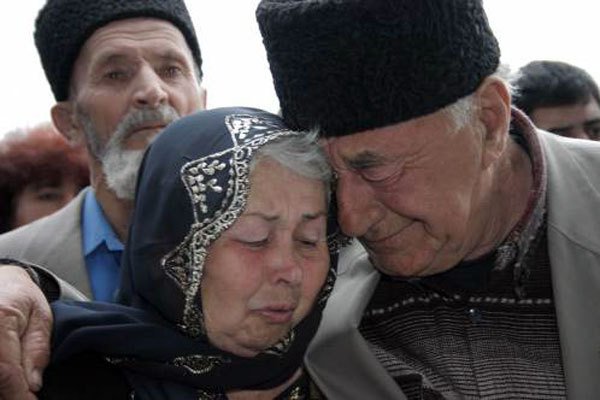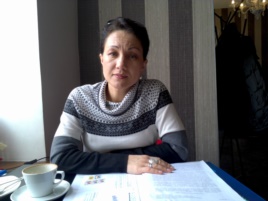Ethnic Ukrainians in the Russian Far East, the descendants of Ukrainians who moved there voluntarily in late tsarist times and forcibly in Soviet ones, are being harassed by Russians there for their support of Ukraine, even as Russians in Crimea are threatening the Crimean Tatars with deportation to that faraway region.
Since the Crimean Anschluss, Natalya Romanenko, head of a Ukrainian choir in Khabarovsk, has been stripped of her job, interrogated by the FSB, forced to make false declarations, and last week was covered with green paint by someone who said that was “for Novorossiya, you Banderite!”
Romanenko told Radio Liberty that she is convinced that all of this is the work of the Russian special services and officials who are carrying out Vladimir Putin’s wishes and persecuting anyone who dares to express his or her own opinion and “defend their Ukrainian friends.”
Up until a year ago, she, her choir “The Well,” and another Ukrainian choir in the region “The Green Wedge” regularly performed not only in the region but across the Russian Federation and even abroad as representatives of the culture of the country. But all that has changed since March 2014.
Romanenko says she is deeply proud of her Ukrainian roots. She was born in Khabarovsk and has lived there her entire life. Her parents were born there, and her grandfather came from Ukraine during the civil war in the hopes of escaping from Soviet power. But by the time he reached Irkutsk, communism had spread to the Pacific, and he settled near a Buryat village.
Despite being two generations removed from Ukraine and having been subjected to Russianizing policies in Soviet and post-Soviet times, she still speaks Ukrainian fluently as do her children. All of them love Ukraine. She adds that while Russians and Ukrainians ay have one been a single people, they “long ago diverged along two different paths.”
The choir director says she is not a political person and consequently does not make political assessments of what has taken place in Ukraine. But she insists that her own visit there convinced her that what the Russian media are saying is simply not true. And she sees no reason for her not to support her Ukrainian friends.
Unfortunately, her current situation is bleak: she says that she has not received any pay for seven months and is living on credit cards. Soon she will be “officially” unemployed. She would leave except for the support she receives from her friends and her feeling that one should love one’s “small” motherland as well as one’s “large” one. But that is increasingly hard to do.
While Ukrainians 9000 kilometers away from Ukraine are being persecuted by Russian officialdom, Crimean Tatars under Russian occupation are being threatened with the prospect that they might be sent there, something many of the members of that nation, already deported once, very much fear.
In a post this week, Oleg Leusenko says that his Crimean Tatar friends continue to be asked by the Russians they live among as some of them have since the Anschluss, “When are they deporting you? We want to move into your house.”
One ethnic Russian doctor asked his Crimean Tatar colleague what he thought the future would entail “they say that they are readying Magadan oblast for you in Russia. Are you going to be going there or will you return back to Uzbekistan” to which the Crimean Tatar doctor’s family had been deported in 1944.
Leusenko says that one Crimean Tatar woman told him that her Russian neighbor had suggested much the same. “When they deport you, we want to move into your house. It is larger than ours and will completely fit our needs.” And such Russians suggest that the Crimean Tatars by their actions have made such an outcome inevitable.
You should be glad to be in Russia, they tell the Crimean Tatars. “Don’t again become traitors and don’t betray Russia. Putin is the best.” And “You are all traitors, you are ungrateful and were against the referendum. As a result, Putin will not forgive you. It would be better if you left.”







